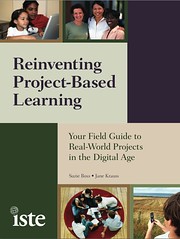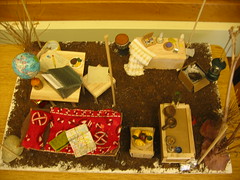Monday, December 31, 2007
Name Your Top 10
Thursday, December 27, 2007
The XO is here!

It's amazing the excitement this little computer inspires! Many XO recipients tell personal stories of its highly-anticipated arrival and the fun that ensues... For just a few reactions, visit the Eugene, Oregon and Classroom 2.0 XO user groups.
My story? I got home from Mexico on the 20th to find the computer had arrived. I was impressed with the packaging-- no bubble wrap or foam peanuts, just a little bit of recyclable cardboard and two sheets of paper. I plugged in the XO and got familiar with the Sugar GUI using the trackpad (nice) and tiny keyboard (oy). First application I looked at was the measuring tape, whereby two XO computers spanning a space can calculate the distance between them using the thin mesh network capability. Now I just need to find another XO in my "neighborhood" to really appreciate the interactive nature of this computer. I couldn't get on the Web right away because the GUI doesn't support WPA (yet). My husband found the shell script and configured the wireless and now I'm up! (This sounds easy but the script was a little broken (since fixed) and the XO wouldn't recognize the USB thumb drive so we installed using an SD memory card instead.)
For another user's experience (more technically smart than I, and boy he's having fun) check out Wesley Fryer's podcast interview with Colin Davitt. Also, this OLPC Wiki page about the XO software is really helpful.
Still playing, and more later, but what are you learning? What do your kids think?
Friday, December 21, 2007
It's Here!

Our book Reinventing Project-Based Learning is finally here! We hope you'll give it a look (and consider purchasing a copy for yourself or a teacher in your life).
Details are at the right of this post.
Here's wishing you the best during this wonderful holiday season.
-Jane and Suzie
Tuesday, December 11, 2007
Foggy Ideas

But what if we turned the tables and went looking for disruptive ideas to shake up learning environments? Here’s a wild idea that seems ripe for borrowing—at least metaphorically.
In the desert highlands of Chile, villagers use a device that looks like a giant volleyball net to harvest clean water from the cloud cover that hangs over the region. Fogcatchers use polypropylene mesh to capture this precious resource, one drop at a time. Water droplets eventually fill community reservoirs, supplying this once-parched region with a clean, sustainable source of water for drinking and farming.
What does this have to do with education? Imagine being able to somehow “harvest” those learning opportunities that seem just out of reach. A fogcatcher for the classroom—can’t you almost see it? Don’t you want one?
Monday, December 3, 2007
Get Inspired
Thursday, November 29, 2007
How Administrators Can Help

Monday, November 19, 2007
Making a difference?
Friday, November 16, 2007
Touring Your Own Town
MYTOWN is another example of city tour as powerful learning experience. This Boston-based program was founded more than a decade ago by a young social entrepreneur. MYTOWN employs teens as urban tour guides, but here’s what’s special: the guides research and write their own scripts. They start by taking a walk around their neighborhood with camera in hand, snapping pictures about sites that interest them. Extensive research follows, leading eventually to a better appreciation of local history and a tour that’s unlike anything else in this city known for walking tours. Check out the MYTOWN video (on the program home page) to learn more.
Anyone Else XO'ing?
Receiving an XO with its amazing design and innovative OS is pretty great too, and T-Mobile has pitched in with a gift. Anyone who purchases the pair (one to give, one to keep) gets free T-Mobile hotspot internet service for a year. Starbucks, airports... can't wait.
Are any of you participating in the campaign? I hope to join a community of practice around teaching with and teaching about the XO. The OLPC wiki space for teachers looks like a good place to start: http://wiki.laptop.org/go/XO_Teachers. I'll set up an XO group in Classroom 2.0, too.
Monday, November 12, 2007
Designing a Project

Click on the thumbnail to see the beautiful mess of initial project planning.
I am preparing a course I'll teach in the winter focused on project-based learning with technology. Teacher participants will learn an instructional design process in order to create their own projects and try out lots of new technologies. I also intend for them to engage in a full project-based learning experience AS STUDENTS because I'm pretty sure it will be the first time for most. The learning project uses postage stamps as its unifying theme but it is much, much more. Here's a snapshot of the first draft of the project. I'll be blogging (and asking teacher participants to blog) about the learning experience. I hope you'll follow us on our journey. I'm rounding up experts now.
Anyone know a philatelist?
The OLPC XO Computer Campaign Nov 12-26
Help make education for the world’s children a priority, not a privilege.
See the One Laptop Per Child Foundation Web site to learn more about the XO and this socially entrepreneurial scheme to get computers in the hands of children worldwide.
If you'd like to contribute to one school's campaign to give and get an XO, read this blog entry.
Thursday, November 1, 2007
AASL Standards - See a Pattern?
The standards have clear parallels with ISTE NETS*S, the Partnership for 21st c. Skills Student Outcomes, and other standards sets that shift from content knowledge to critical thinking. See the AASL Standards here.
Johns says the AASL standards are the backbone of a strong library media program, but I think their applicability goes beyond. With districts moving away from even minimal staffing for library media specialists, my question to AASL is: Without LMS agency, how do you share these important standards and help teachers and administrators put them to work?
Monday, October 29, 2007
See yourself in this picture?
Monday, October 22, 2007
Projects Worth Joining
How big is your classroom?
Saturday, October 13, 2007
Standards, Public Opinion Support New Literacies
The political current might be working against us, but thought leaders and the public have grabbed an oar. ISTE's recently revised NETS*S, the American Association of School Librarians 21st Century Library Learning Standards (due Oct. 25), and this week's survey of public opinion all support the rigor, complexity and authentic tasks are at the core of PBL. Let's keep our shoulder to the oar a little longer.
Below is a draft version of the AASA learning standards. When the entire doc is released you'll see that AASL describes the skills, responsibilities, and dispositions associated with each standard, and also suggests self-assessments.
AASL 21st Century Library Learning Standards
Learners use 21st century information skills, resources and tools to:
I. Inquire, think critically, and gain knowledge.
II. Draw conclusions, make informed decisions, apply knowledge to new situations, and create new knowledge
II. Share knowledge and understandings with others and participate ethically and productively as members of our democratic society
IV. Pursue personal and aesthetic growth
Can you think of any better way to address these standards than through Project-Based Learning?
Thursday, October 11, 2007
Join Us for an ISTE Webinar
Reinventing Project-based Learning
Wednesday, October 24, 2007 at 1:00 Pacific/4:00 Eastern
Monday, October 8, 2007
Social Networks and Education
Edtech maven Andy Carvin has gone to work at NPR. On October 4 he joined Talk of the Nation to discuss The Sociology of Social Networks. Not surprisingly, many educators joined the discussion and offered advice. See what you think.
Using social networks in the classroom is a bit complicated but one thing is clear, social networks give educators a unique opportunity for just-in-time, peer-to-peer professional learning. No longer do we wait for course offerings or workshops delivered by "experts". We ARE the experts and social networks allow us to teach and learn from each other. And given the "long tail" access social networks allow, we can dig into discrete and sometimes arcane topics and find others who are interested, too.
In Ning group Classroom 2.0 educators explore everything from pedagogy (how learning can change in the Web 2.0 era) to specific practices (enhancing spatial awareness with Google Earth). In another Ning group, Global Education, we form classroom collaborations across many time zones and discuss global citizenship and the digital divide.
It's wonderful to find optimistic and adventurous colleagues through social networks. The profession is better for this development in collaborative engagement, and we encourage teachers to join in.
Saturday, October 6, 2007
Chip In for an XO
Help make education for the world’s children a priority, not a privilege.
For two weeks starting November 12, One Laptop Per Child is selling the *XO computer to the likes of you and me.
 For $399.00 you can purchase one for yourself and one for a child in a developing country. I want an XO to learn from and teach with, and am thrilled that I can send one to a child. See the ChipIn widget in the lower right? You can help. I'd like to raise half the amount from kindred spirits. In return, I'll give the computer a workout and share stories about using it with kids and in professional development. I also plan to track down the school where the XO gift goes and make connections there. Stay tuned! Chip in!
For $399.00 you can purchase one for yourself and one for a child in a developing country. I want an XO to learn from and teach with, and am thrilled that I can send one to a child. See the ChipIn widget in the lower right? You can help. I'd like to raise half the amount from kindred spirits. In return, I'll give the computer a workout and share stories about using it with kids and in professional development. I also plan to track down the school where the XO gift goes and make connections there. Stay tuned! Chip in!- Visit OLPC to learn more.
- Read an earlier post about the XO in Galadima, Nigeria.
Thursday, September 20, 2007
Is 'Easy' the Answer?
Wednesday, September 12, 2007
They're at it again!
Thursday, August 2, 2007
Mashups, anyone?
Tuesday, July 10, 2007
NECC Wrap Up
The peripatetic Wes Fryer (where wasn't he at NECC?) recorded our book preview session in Atlanta. His podcast, blog notes and links can be found here. Thanks Wes!

You can find our Reinventing session presentation, handouts and blogger responses on our NECC page.
Here's a last pitch asking folks to post a photo of their NECC magnolia blossom to a special flickr group: NECCBUD. This little experiment to see how far flickr (killer web 2.0 photosharing app) has penetrated the consciousness of NECC-goers leads me to believe that 1. people ditched their 4,000 flowers (too much to carry!) OR 2. flickr isn't essential to the average NECC attendee OR 3. multiple channels used to disseminate the idea didn't go very deep OR 4. it was a lame idea . What do you think? Other possibilities?
Thursday, June 28, 2007
Face Time

Think (and Teach) Globally
Alan November made a compelling case for integrating global thinking across the curriculum. One strategy: Give students a global voice by using the social networking sites and technology tools that the majority of schools continue to block and confiscate.
One NECC Blossom Comes Home to Eugene, Oregon

NECC bud comes home to Eugene
Originally uploaded by jkrauss
A NECC magnolia bud looks just right on my salmon egg-to-fry specimen display.
As I admired my NECC magnolia blossom this morning I got to wondering, where did the other 3,999 go? If you got a bud at the opening keynote (or if like me you received one from a kind stranger), why not take its picture and upload to a flickr group just for NECC flowers? Add the tags neccbud or necc2007, and a geotag, too. I wonder, how many will we see? My inspiration is the paper crane project hosted by Eshu, who is folding and then sending 1,000 paper cranes around the world with one request: Show where they alight. (You won't find better photographs on Flickr than those in the paper crane project. Here's one of my favorites.)
The neccbud group at flickr: http://www.flickr.com/groups/442796@N22
Monday, June 25, 2007
NECC - We're here!
If you blog and flickr snap our session (please!) use this tag: necc, n07s606.
More after the session!! -Jane and Suzie
Friday, June 22, 2007
Join Us in the Flickr Group: Reinventing PBL

SPI: On TV
Originally uploaded by carpe icthus
Ryan "I shoot everything" Brenizer, an NY photographer, worked with Bronx high school students as they honed their journalism chops through the Student Press Initiative (SPI).
Ryan, or "Carpe Icthus" on Flickr, is one of 25 contributors to the Reinventing Project-Based Learning photo group on Flickr. Please join the group and post photos that express the power of pbl in the digital age.
As Ewan McIntosh said on learning of the new group, "Why Flickr screenshots and pics? Because sometimes all you want is a visual flash at what is possible before trying to apply the principle to the culture and framework in your school or classroom." Exactly! Join in, inspire, and be inspired.
Thursday, June 21, 2007
Power of Connections
Friday, June 15, 2007
School Galadima in Nigeria gets busy with the XO

Galadima gets busy with the XO
Originally uploaded by jkrauss"[Teachers are guided to change practice, in order to turn children] from passive students who just absorb, memorize, and repeat, into active constructionists who actively collaborate, investigate, experiment, and create solutions." -from Carla Gomez Monroy, Learning Consultant, One Laptop per Child (OLPC). I'd really like to talk to Ms.Gomez Monroy about implementation and student, family and teacher responses to the new tool. A discussion of localization and potential for impact on community and culture has started on the OLPC wicki:http://wiki.laptop.org/go/Localization_Common_Room.
Image from One Laptop Per Child Foundation (OLPC) wiki: wiki.laptop.org/go. Used under creative commons license 2.5.
Wednesday, June 13, 2007
Reinventing Project-Based Learning - The Cover

ReinventingCover
Originally uploaded by jkrauss
Here's the hot-off-the-designer's-desk proto photo of our book cover.
The size and shape of the book are like the field and travel guides we carry on adventures. We intend for this "field guide" to become an indispensable resource, a trusty guide for educators to use when they embark on their journey into projects.
The book keeps the metaphor of travel and field work going: getting your bearings, identifying fellow travelers, planning for your adventure, packing up, setting out, having marvelous experiences (and solving problems that inevitably arise), documenting all along the way, and celebrating and reflecting on the journey when you arrive back home.
Reinventing Project-Based Learning: Your Field Guide to Real-World Projects in the Digital Age will be available in the fall.
Monday, June 11, 2007
Jane Goodall's Camp - Capturing the Ephemera of School Displays

Jane Goodall's Camp
Originally uploaded by lewiselementary
Sophie in Grade 3 recreated Jane Goodall's field camp in a lovely diorama. Click on the photo to go to Flickr and mouse over "note" squares that identify the different elements in the display.
This picture, posted to Flickr by Principal Tim Lauer, is included in the Classroom Displays group, which gives a window into the ephermera of school displays.
Classroom Displays serves a growing community of practice and is featured in our book Reinventing Project-Based Learning.
Look at displays contributed by 113 group members and ask yourself: What do class displays tell us about what goes on in school, and about what we value in student work? Visit Classroom Displays Group on Flickr and read host and Edublogger Award Finalist Linda Hartley's blog. Linda describes her purpose and what she's learning on her research site Acting to Improve.
Thursday, May 31, 2007
Authentic Assessment: You're Funded!
Tuesday, May 22, 2007
Romeo, Juliet, and MySpace
Monday, April 16, 2007
What's essential?
- Ubiquity
- Deep Learning
- Making Things Visible and Discussable
- Expressing Ourselves, Sharing Ideas, Building Community
- Collaboration
- Research
- Project Management
- Reflection and Iteration


